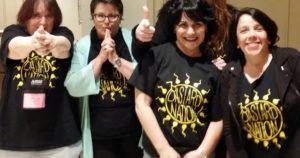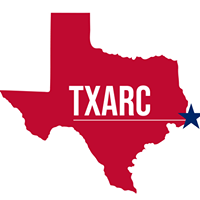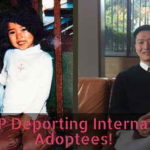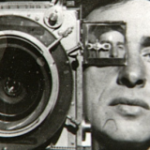By DEBBIE BLOSSOM
SUN Staff Writer
There was a time when Pat Marler couldn’t even say the word “bastard.”
Today, however, it slips easily into her conversations, and she even has a T-shirt that is printed with a logo and the phrase “Bastard Nation.”
And the Edmond resident isn’t afraid to wear it.
Marler is a member of an organized group of adult adoptees who are fighting for their identities – people who want nothing more than the right to the official documents that say who they are and where they came from.
A fight, she says, that may take a long time to win.
In most states, outdated laws that seal adoption records leave adult adoptees without legal access to birth certificates when they turn 21, unless they can persuade a judge to open those records.
But Marler and a growing number of adults across this country and the world want the same rights as anyone else. They want to know who their birth parents are, even if they aren’t planning to contact them.
They want to uncover their historical and genetic identity, especially any medical information that could make a difference in their health and the health of their families.
“None of this is about children – it’s about adults,” she said.
As Oklahoma’s vocal contact for Bastard Nation, Marler makes it a point to know what the laws are in other states and what legislation might be pending.
She spends at least two hours a day answering e-mail from
others wanting to know which way to turn as they search for records and birth parents. She has publicly rallied for a change in Oklahoma and supported adoptees in other states as their laws have been challenged, revised and contested.
“That’s what we are working for here,” Marler said. “That’s what we’re all about.”
—-
When Marler was born in 1945, pregnancy outside of marriage and adoption itself was shrouded in secrecy and a stigma that has eased a generation later.
Initially, she said, sealed records and confidentiality was intended to protect adoptive parents and children from disapproval from a community, but those standards simply don’t apply in a changing world.
Instead, sealed records now protect birth parents who believe their rights and promises of privacy will be invaded if their children obtain their birth certificates.
And Marler is exasperated with lawyers, legislators and adoption agencies who continue to refer to all adoptees as children whose rights are less important than those of the parents.
“Birth parents get more rights than adopted adults,” she said.
And that’s just not fair, she added. “There is no law giving parents total anonymity for the rest of their lives.”
Marler said she is lucky. She found her birth mother with the assistance of members of a support group she attended and a searcher who found her documents but couldn’t reveal the contents.
“Someone else looks up your records,” she said, unhappily referring to the state of Iowa’s confidential intermediary system that is similar to Oklahoma’s. “Everyone looks through your records but you … it’s like you can’t take care of your own private life.”
But the end result was positive, and Marler recalls nervously calling the mother she never knew.
“I contacted her and she was excited … her first words were, ‘What took you so long?'”
Through her birth mother, she quickly located her father, who was ill at the time. Although he didn’t want to establish a relationship, he did fill Marler in on the various forms of cancer on his side of the family.
It was an impersonal encounter over the telephone, but she finally had the medical background she needed for herself and her two sons. “It doesn’t just affect me, but everyone down the line.
“I’m disappointed he didn’t want to meet me, but that is his right to not have a relationship with me,” she said.
But like most adult adoptees, Marler wondered about her birth parents.
“I just wanted to know who they were … you always wonder, ‘Who do I look like?’ It completed what I needed to have in my life.”
—-
Marler’s search for her birth parents took less than a year, but “I had been thinking about it for 48 years,” she said.
Yet it still took four more years of endless phone calls and wading through bureaucratic red tape to finally get her original birth certificate released and into her hands in Oklahoma.
“It was my determination,” she said, that finally led her to a judge in the county where she was born who unsealed her past. “He knew there was no reason not to.”
Bastard Nation’s goal is for every state to have laws like those in place in Kansas, where every adoptee who is 21 or older can legally obtain a birth certificate.
“Kansas is totally open, and always has been,” Marler said. “Hopefully, someday it will happen here.”
There is also unconditional access in Alaska, but there are stipulations to the law in Montana. Last year, voters in Oregon passed an initiative, Ballot Measure 58, that allowed for open records. But that move is now being challenged as well as new legislation in Tennessee.
This session, legislators in Texas are considering replacing a 1973 law that sealed records, and Marler said she is keeping her eye on Oklahoma’s neighbor to the south.
In January 1998, Oklahoma approved a mutual consent registry that allows adult adoptees to sign up, at the cost of about $400, for a search that usually concentrates on locating a birth mother.
If found, the birth mother can choose not to release the name of the father or any information, she said.
“It’s not a fair process, and it puts another governmental process on an adopted person who doesn’t need it.”
She doesn’t support the program although she does tell people who contact her about it. There are other national registries that help adoptees search, and their services are free.
—-
When it comes to change, Oklahoma is behind the times, Marler said.
“Oklahoma is a sleeping state” she maintains. There is no legislation pending with lawmakers and few people are active in the campaign for adult adoptees’ rights.
As one small voice in a sea of opposition, she knows that alone she can’t change the world. “As one person, I don’t think I have too much clout,” she said.
So her goal is to make more people aware of and involved with Bastard Nation, even adoptees who don’t have a desire to contact their birth parents.
She hopes to forever dispel the notion that the word “bastard” means something bad. “I’ve learned to say it and I can be proud of it.”
“I’m making this something positive … working for adoptive people’s rights. You can legislate laws, but you can’t legislate biology.
“You’re different than your adoptive parents … you don’t have the same genes.”
Yet out-of-date thinking prevails, she said, and once someone is adopted, those genetic ties are broken – forever.
“How do you do that?” she said. “Realistically, you can’t.”


 New York Adoptee Rights Coalition
New York Adoptee Rights Coalition











